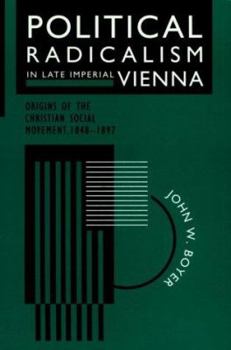Political Radicalism in Late Imperial Vienna: Origins of the Christian Social Movement, 1848-1897
Select Format
Select Condition 
Book Overview
John Boyer offers a meticulously researched examination of the social and political atmosphere of late imperial Vienna. He traces the demise of Vienna's liberal culture and the burgeoning of a new radicalism, exemplified by the rise of Karl Lueger and the Christian Socialist Party during the latter half of the nineteenth century. This important study paves the way for new readings of fin de siecle Viennese politics and their broader European significance. "Offers a comprehensive, multicausal study of the rise of Christian Socialism in Vienna, that phenomenon which was experienced nowhere else in urban Central Europe and which culminated in the famous clash between the Austrian establishment and the colourful, domineering lead of the movement, Karl, Lueger."--R.J.W. Evans, History "Boyer's analysis is masterful in terms of research, exposition, and organization. His use of available economic data is judicious, and his sense of the social structure of late nineteenth-century Vienna is formidable."--William A. Jenks, American Historical Review "To understand Viennese and even imperial politics in the latter half of the nineteenth century, Boyer's book is absolutely essential.""--Robert Wegs, Review of Politics
Format:Paperback
Language:English
ISBN:0226069567
ISBN13:9780226069562
Release Date:May 1995
Publisher:University of Chicago Press
Length:592 Pages
Weight:1.70 lbs.
Dimensions:1.3" x 6.0" x 9.0"
Customer Reviews
1 rating
Political Culture, Radicalism and the Road to Philippi
Published by Thriftbooks.com User , 17 years ago
Since the 1970's, it is generally accepted that fin de siècle Vienna was a birthplace of a major part of the modern culture and mentality if not of modernity itself. In the conventional picture of the origins of modernism, the Habsburg capital is the central fixture. This was primarily due to the popular success of Carl Schorske' pioneering study, Fin de Siècle Vienna: Politics and Culture (1980). Very briefly, Schorske explained both the origins of the ahistorical modernist mindset (as well as its discontents) in Vienna as a result of the retreat by the heirs of Austrian liberal tradition from the political realm into aesthetics and psychological in face of the rise of mass illiberal politics as exemplified by the Christian Social Party led by Karl Leuger. Later variants of this paradigm, based on unexamined assumptions about the nature of liberal influence on Austrian society have continued to structure the study of late 19th century politics and culture in Central Europe. The normalization of radical nationalism and anti-Semitism in Austrian political culture around 1900 has been depicted as marking simultaneous rejection of all things liberal and a decisive middle class retreat from politics and emblematic of an entire epoch in European history. Ultimately, this paradigm requires the self-conscious renunciation of liberalism as a necessary and sufficient condition of the birth of the modern. By late 1980's, (due to Boyer's book and Pieter Judson's work on the liberal legacy) the assumptions underlying the Schorskean paradigm ("failure of liberalism" thesis or his claim that both modern mass politics and the rejection of the bond between art and society simultaneously has their origins in Vienna) were found to be untenable and based on uneven monographic basis. Boyer focusing in this very detailed study on over five decades (1848-97) of Austrian politics in general and of Vienna in particular, shows that the supposed clash between 'rationalist' liberalism and 'irrationalist' anti-liberalism in Vienna was a distortion of what actually happened. Liberalism's retreat, after the enfranchisement of lower middle classes by the Taaffe regime in the 1880's was more due to their continued anti-democratic stance and continued support of restricted franchise (to those who paid at least an annual 10-florin tax or about 5% of the population) and exclusivity rather than their rationalism. Boyer re-interpretation of the rise of Christian Social party and the demise of liberal tradition centers on the unique coalition of social and occupational groups that was forged in a consecutive four stage process by Karl Leuger between 1880 and 1896, some of these groups being traditional supporters of liberals. The artisans were co-opted between 1880 and 1886, the priests and Democrats between 1886 and 1890, the teachers and civil servants between 1890 and 1894 and finally the property owners in the crucial years of 1895-96. Central to the arguments of the book in tr





